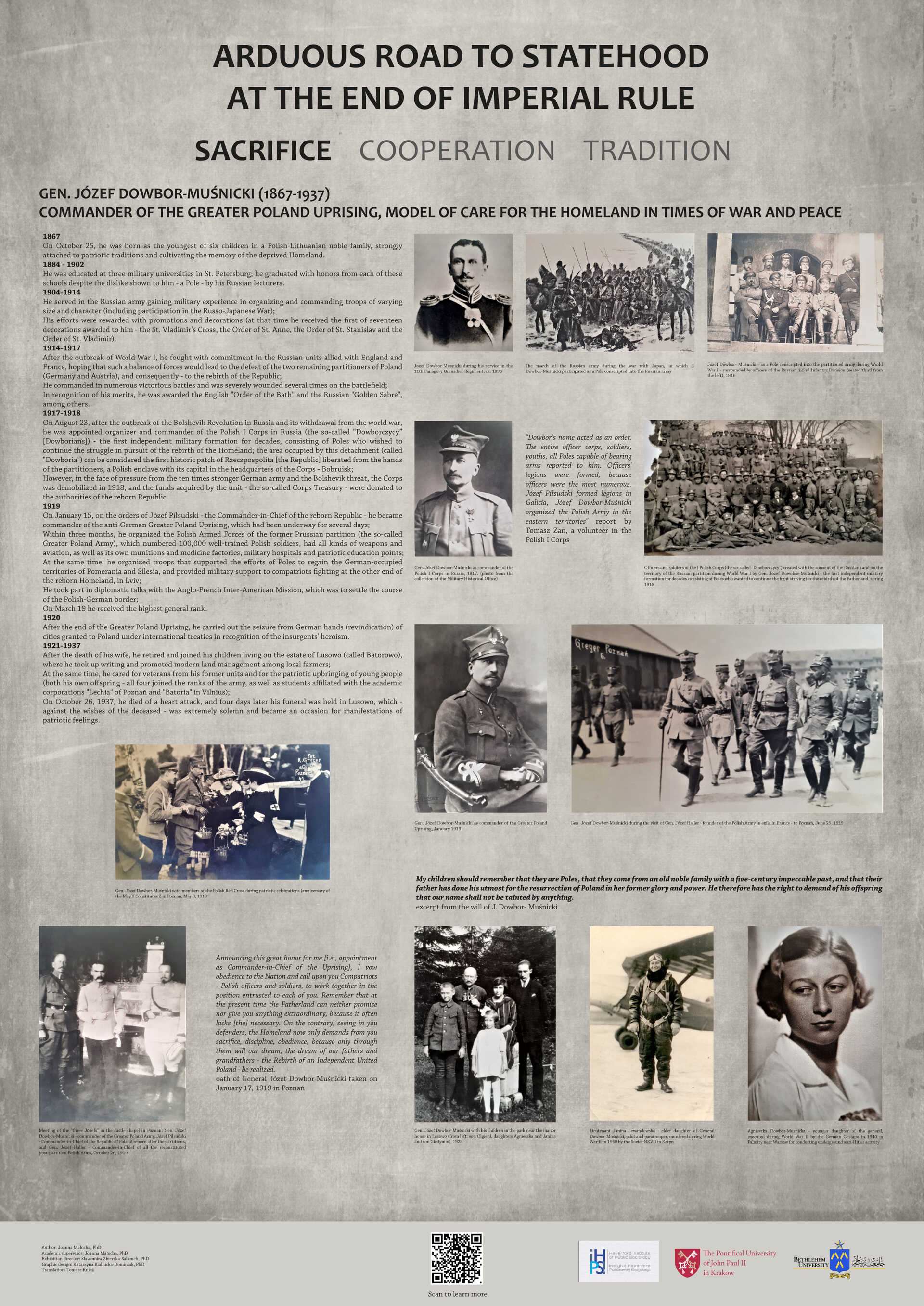III. Gen. Józef Dowbor-Muśnicki

You can download the HQ PDF version of the poster HERE.
Gen. Józef Dowbor-Muśnicki (1867-1937) - Commander of the Greater Poland Uprising, model of care for the Homeland in times of war and peace
1867
- On October 25, he was born as the youngest of six children in a Polish-Lithuanian noble family, strongly attached to patriotic traditions and cultivating the memory of the deprived Homeland.
1884 - 1902
- He was educated at three military universities in St. Petersburg; he graduated with honors from each of these schools despite the dislike shown to him - a Pole - by his Russian lecturers.
1904-1914
- He served in the Russian army gaining military experience in organizing and commanding troops of varying size and character (including participation in the Russo-Japanese War);
- His efforts were rewarded with promotions and decorations (at that time he received the first of seventeen decorations awarded to him - the St. Vladimir's Cross, the Order of St. Anne, the Order of St. Stanislav and the Order of St. Vladimir).
1914-1917
- After the outbreak of World War I, he fought with commitment in the Russian units allied with England and France, hoping that such a balance of forces would lead to the defeat of the two remaining partitioners of Poland (Germany and Austria), and consequently - to the rebirth of the Republic;
- He commanded in numerous victorious battles and was severely wounded several times on the battlefield;
- In recognition of his merits, he was awarded the English "Order of the Bath" and the Russian "Golden Sabre", among others.
1917-1918
- On August 23, after the outbreak of the Bolshevik Revolution in Russia and its withdrawal from the world war, he was appointed organizer and commander of the Polish I Corps in Russia (the so-called “Dowborczycy” [Dowborians]) - the first independent military formation for decades, consisting of Poles who wished to continue the struggle in pursuit of the rebirth of the Homeland; the area occupied by this detachment (called "Dowboria") can be considered the first historic patch of Rzeczpospolita [the Republic] liberated from the hands of the partitioners, a Polish enclave with its capital in the headquarters of the Corps - Bobruisk;
- However, in the face of pressure from the ten times stronger German army and the Bolshevik threat, the Corps was demobilized in 1918, and the funds acquired by the unit - the so-called Corps Treasury - were donated to the authorities of the reborn Republic.
1919
- On January 15, on the orders of Józef Piłsudski - the Commander-in-Chief of the reborn Republic - he became commander of the anti-German Greater Poland Uprising, which had been underway for several days;
- Within three months, he organized the Polish Armed Forces of the former Prussian partition (the so-called Greater Poland Army), which numbered 100,000 well-trained Polish soldiers, had all kinds of weapons and aviation, as well as its own munitions and medicine factories, military hospitals and patriotic education points;
- At the same time, he organized troops that supported the efforts of Poles to regain the German-occupied territories of Pomerania and Silesia, and provided military support to compatriots fighting at the other end of the reborn Homeland, in Lviv;
- He took part in diplomatic talks with the Anglo-French Inter-American Mission, which was to settle the course of the Polish-German border;
- On March 19 he received the highest general rank.
1920
- After the end of the Greater Poland Uprising, he carried out the seizure from German hands (revindication) of cities granted to Poland under international treaties in recognition of the insurgents' heroism.
1921-1937
- After the death of his wife, he retired and joined his children living on the estate of Lusowo (called Batorowo), where he took up writing and promoted modern land management among local farmers;
- At the same time, he cared for veterans from his former units and for the patriotic upbringing of young people (both his own offspring - all four joined the ranks of the army, as well as students affiliated with the academic corporations "Lechia" of Poznań and "Batoria" in Vilnius);
- On October 26, 1937, he died of a heart attack, and four days later his funeral was held in Lusowo, which - against the wishes of the deceased - was extremely solemn and became an occasion for manifestations of patriotic feelings.



